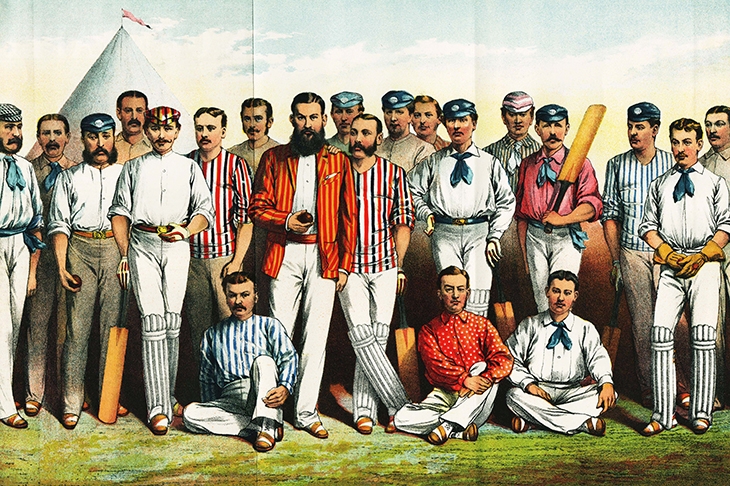At the beginning of August this year, the England test team played what is supposed to have been the 1,000th test match since the 1877 Ashes test against Australia in Melbourne, a match which was won by Australia by 45 runs. But was it really a test match? The players in that 1877 game had no idea they were test cricketers. England’s finest player, W.G. Grace, wasn’t there. Nor was Australia’s great bowler, Fred Spofforth. England played as James Lillywhite’s XI and only later was the match awarded test status.
Nevertheless, the show was on the road. Simon Wilde, cricket correspondent of the Sunday Times, has had the engaging idea of telling the story of the England national team. It started out as a profit-making enterprise, arranged by impresarios such as Lillywhite, but was quickly appropriated by the MCC, which regarded itself as a gentleman’s club. Only in the 1970s was the MCC forced to relinquish control to what has today become the English Cricket Board, an organisation in thrall to marketing experts.
It is difficult to judge whether the ECB or the MCC has done more lasting damage to the game. Both are responsible for turning cricket into a minority sport, the
MCC because of its preoccupation with class and the ECB on account of its obsession with commercialism.
This book is essentially a history of the rise of conformity. Nothing can beat the early days of test cricket, populated by cheerful and life-enhancing characters such as Aubrey Smith, who captained England on the first tour of South Africa in 1888–89 and later became a Hollywood character actor. During the Aubrey Smith era England sides had the exuberant but chaotic air of social cricket teams on tour. Players might find themselves umpiring in the tests they were actually playing in.
Others were chosen on pragmatic grounds of availability.
Take the Harrovian C.E.B McMaster. He played in one South African test match (also retrospective), during which he was dismissed for a golden duck, took no wickets and made no catches. This was not merely McMaster’s only test match, but his only first-class game. In the words of the cricket historian Richard Heller: ‘He is a cricketing Yarborough, a total statistical nullity.’
Rather than impose a chronological narrative, Wilde divides his book into thematic essays, some of which are a source of amazement. Of course a book of this scope is open to criticism. I think Wilde is generous about the cricketing grandee Gubby Allen. Others will honourably disagree. Talking points of this kind are part of the pleasure of such a volume, and one of the best things about Wilde is his dispassionate ordering of the facts.
One of the most depressing sections is Wilde’s account of the fake nationalism which has recently been imposed on the English team. Marketing experts have created the heavy-handed Three Lions symbol, but the patriotism of the England team is a construct. The appalling Kevin Pietersen, a petulant South African whose selfish conduct led to well-deserved expulsion from the English team in 2014, drew in the crowds but behaved like a mercenary.
Wilde asserts that Eoin Morgan, captain of the England one-day side, has declined to sing the national anthem before games. This is understandable, even admirable, given that he is Irish. In Morgan’s favour, this singing of the national anthem is a tiresome and embarrassing intrusion. But such conduct nevertheless raises the question of whether he should be playing for his native Ireland rather than England.
Wilde provides an interesting parallel between the young Ian Botham and the current possessor of the all-rounder slot, Ben Stokes. The latter was notoriously banned from last winter’s Ashes side after getting involved in a brawl near a nightclub in Bristol. By contrast, Botham, facing a ‘charge of actual bodily harm arising out of an incident in Scunthorpe during a night out with some Scunthorpe FC team mates’, was allowed to tour the West Indies as captain the following month with the charge hanging over him. (Botham was later found not guilty.)
This book, indispensible to any serious cricket lover, is an important work of scholarly synthesis which establishes Wilde as one of our foremost cricket historians. Its range both complements and bears comparison with Derek Birley’s superlative A Social History of Cricket.
Will the England team play a 2,000th test match? Improbable. Future generations may marvel at how a form of sporting contest, often ending in a draw despite being played over five days and sometimes many more, came to intrude so profoundly into the English national consciousness. Wilde’s well-written book hints at some of the answers.






Comments